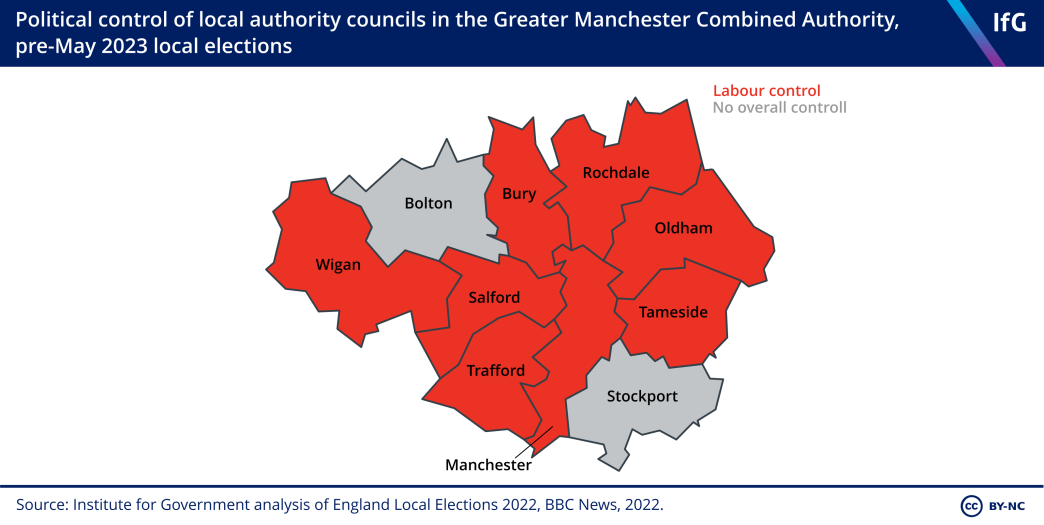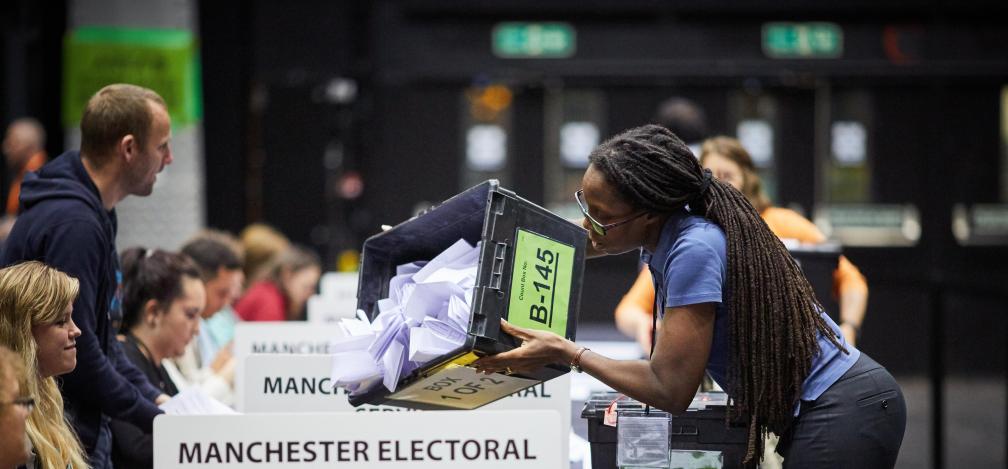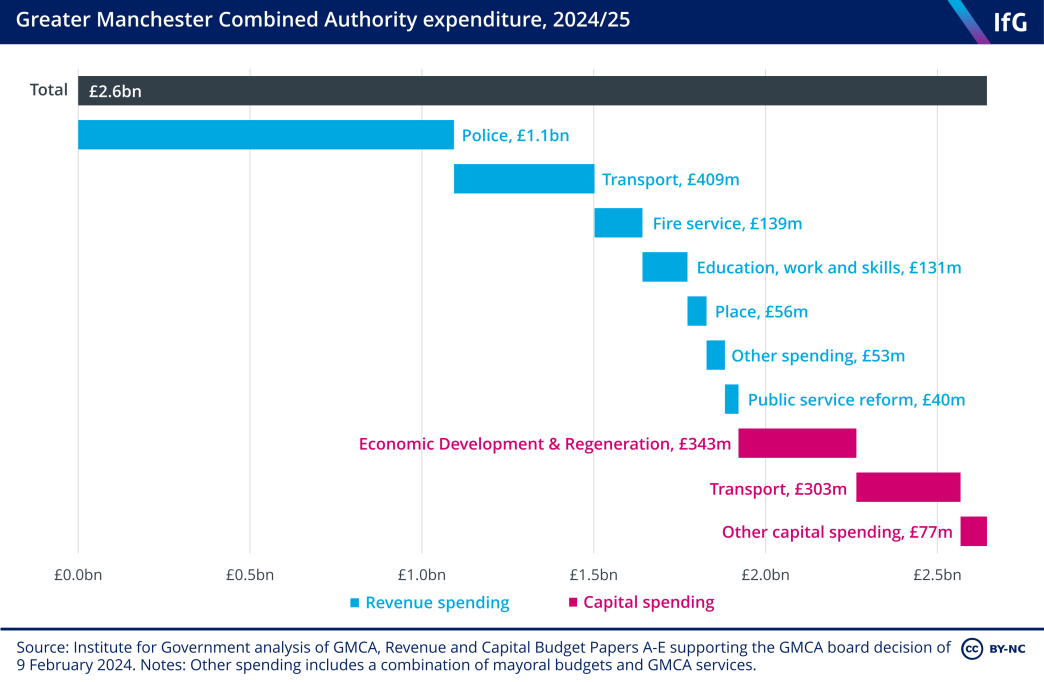Local elections 2024: Mayor of Greater Manchester
Incumbent Labour mayor Andy Burnham is standing for the third time in May's mayoral elections.

On 2 May 2024, voters in Manchester and nine neighbouring local areas will vote to elect the mayor of Greater Manchester. Incumbent Labour mayor Andy Burnham is standing for the third time with the Conservatives’ Laura Evans his main challenger.
What is the history of devolution to Greater Manchester?
The Greater Manchester Combined Authority (GMCA) was established in April 2011 using powers under the Local Democracy, Economic Development and Construction Act 2009. As a combined authority, it has the ability to take certain collective decisions across council boundaries.
In November 2014, a ‘devolution deal’ was agreed between the UK government and GMCA. This led to the transfer of functions from Whitehall, including over transport, planning, skills and economic regeneration. As part of the deal, GMCA agreed to the creation of the new post of mayor, who became its chair. Several subsequent deals have led to further functions being conferred on GMCA. 16 Greater Manchester Combined Authority, ‘Greater Manchester’s Seven Devolution Deals’, Greater Manchester Combined Authority, no date given, https://www.greatermanchester-ca.gov.uk/media/4695/greater-manchesters-seven-devolution-deals.pdf
What is the Greater Manchester Combined Authority?
GMCA has 10 constituent local authorities: Bolton, Bury, Manchester, Oldham, Rochdale, Salford, Stockport, Tameside, Trafford, and Wigan. The total population of the area covered by the combined authority is 2.8 million.
The Labour Party currently has majority control of eight of the constituent councils of the combined authority. The two exceptions are Bolton and Stockport, which are both under no overall control and led by Labour and the Liberal Democrats respectively.

Who are the candidates for the May 2024 Greater Manchester mayoral election?
The mayor of Greater Manchester is Andy Burnham, the former MP for Leigh and cabinet minister under Gordon Brown. He represents the Labour Party and was first elected in May 2017 and re-elected in May 2021, receiving 67% of first-preference votes including over 60% of the vote in all 10 local authority areas.
Burnham is standing for a third term in the 2 May 2024 election, which is taking place using the first-past-the-post vote system for the first time. The Conservative party candidate is Laura Evans, a former councillor who previously stood for the party in the 2021 mayoral election. 20 Joseph Timan, ‘Tories select new mayoral candidate who 'always stood against most of Andy Burnham's proposals'’, Manchester Evening News, 22 March 2024, retrieves 26 March 2024, www.manchestereveningnews.co.uk/news/greater-manchester-news/tories-select-new-mayoral-candidate-28867194 Laura Evans was selected as the candidate after the previous candidate, Dan Barker, defected to Reform UK in March 2024. Barker will represent the latter party in the upcoming mayoral election. 21 Kevin Kitzpatrick and Sam Francis, ‘Tory Greater Manchester mayoral candidate Dan Barker defects to Reform UK’, BBC News, 21 March 2024, retrieved 26 March 2024, www.bbc.co.uk/news/uk-politics-68623838
The Liberal Democrats have selected Jake Austin, a Stockport Councillor, as their candidate. Hannah Spencer, a Trafford Councillor has been chosen as the Green Party Candidate. 22 Joseph Timan, ‘Green Party names Trafford councillor as candidate for Greater Manchester mayor’, Manchester Evening News, 25 March 2024, retrieved 26 March 2024, www.manchestereveningnews.co.uk/news/greater-manchester-news/green-party-names-trafford-councillor-28881275 Nick Buckley, who stood as the candidate for Reform UK in the 2021 mayoral election is standing as an independent candidate.
Local and mayoral elections 2024
On Thursday 2 May, voters across England and Wales will head to the polls in a major set of mayoral and local elections. Keep up with our latest content, events and analysis on why these elections matter and the results when they come.
Find out more
What are the powers of the Greater Manchester Combined Authority?
The mayor of Greater Manchester and GMCA exercise powers including over transport, skills, employment support, planning and regeneration, policing and fire services. GMCA also holds responsibilities not devolved elsewhere such as a role – in partnership with UK government departments – in health and social care commissioning and justice policy.
Transport is a key devolved responsibility. GMCA controls a local transport budget and a range of associated transport powers, including over the road and active travel networks. In autumn 2024, GMCA was the first combined authority to take control of the local bus system via a franchising scheme, and already controls the local tram system. GMCA is progressing plans for smart ticketing, as part of a wider vision to create a ‘London style’ transport system, which will eventually also include local rail services.
GMCA is also responsible for the 19+ adult education budget, enabling it to develop a skills strategy that fits the needs of the local labour market. Like the Greater London Authority, but unlike other mayoral combined authorities, it is responsible for commissioning employment support for long-term unemployed and disabled workers.
On housing and planning, the mayor can undertake compulsory purchase orders, with the consent of the local authority in which the site to be purchased is situated. The mayor can also develop a statutory spatial development strategy with the unanimous agreement of all constituent councils. After Stockport council vetoed the proposed spatial plan, the other nine districts have worked together to develop their own joint plan.
The mayor of Greater Manchester has taken on the functions of the police and crime commissioner for the region, along with responsibility for the fire and rescue service.
GMCA has partial control of a £6 billion health and social care budget, exercised via a partnership with the NHS, and has a co-commissioning role over local offender management systems. 26 BBC, ‘Manchester signs devolution deal for more criminal justice system powers’, BBC, 7 July 2016, retrieved 5 May 2022, www.bbc.co.uk/news/uk-england-manchester-36735175
Greater Manchester agreed a ‘trailblazer’ devolution deal with the government in March 2023, as did the West Midlands. Once implemented, this deal will give GMCA further powers over post-19 skills, housing and regeneration, transport, and net zero.
The deal will also reform GMCA’s funding model to treat it more like a government department, giving GMCA more autonomy. Several funding streams will be consolidated into a single, non-ringfenced, settlement for each spending review period. In exchange, GMCA and the government will agree a “streamlined, overarching single accountability process” with specific outcomes for GMCA to achieve over each spending review period.
Institute for Government analysis indicates that GMCA’s single settlement would have been £734m if it were in place for the 2022/23 financial year.
What is the Greater Manchester Combined Authority’s budget?
In February 2024, GMCA agreed a balanced budget of £2.6bn for the 2024/25 financial year split between £0.72bn capital expenditure and a £1.92bn revenue, for day-to-day spending. 27 Figures for the GM Police and the Police and Crime function were submitted to the GMCA Board on 30 January 2024 and a further report on the funding was submitted to the GMCA board in March 2024 and can be seen at https://democracy.greatermanchester-ca.gov.uk/documents/s31686/GM%20Police%20Fund%20Revenue%20and%20Capital%20Budget%202024-25_March%20Panel%20report… 28 Figures draw from the 2024/25 Mayoral General Budget and Precept Proposals, GMCA Transport Revenue Budget, GMCA Revenue General Budget, GM Waste Disposal Budget, GM Capital Programme as approved at the GMCA Board meeting on 30 January. Supporting files can be seen at https://democracy.greatermanchester-ca.gov.uk/ieListDocuments.aspx?CId=136&MID=5340
A total of £343m (50%) of the planned capital budget is allocated to economic development and regeneration. Transport capital investments (£303m) accounts for most of the rest of the planned capital spending.
The largest source of capital funding is grant funding, including the Housing Investment Fund, which alone accounts for £210m (31%) of planned capital spending in 2024/25. Borrowing by the combined authority and capital receipts will also contribute a substantial amount of capital funding.
As for the revenue budget, £1.1bn (56%) of planned expenditure relates to policing responsibilities and £409m relates to transport. £131m has been allocated to education, work and skills. Important sources of income include central government grants, such as a £97m adult education budget, a £49m bus service improvement grant and £43m from the UK Shared Prosperity Fund.
Some revenue also comes from local taxes. The mayor has the power to set a council tax precept to provide additional discretionary spending power. For 2024/25, this precept has been set at £112.95 per year for a Band D property. There is a separate police precept, as in other parts of England, while some business rates revenue is also retained locally.

Overall, GMCA raises around 3% its revenue directly via the mayoral precept. Its constituent members also pay a transport levy and a waste levy, which account for another 15%.
How does GMCA compare to the rest of the UK in terms of social and economic outcomes?
Greater Manchester underperforms the national average across several core economic indicators. Economic productivity and gross median weekly pay are both below the UK average, and while there is variation across the local areas, only Salford exceeds the UK average in terms of productivity and only Stockport and Trafford exceed the UK average in terms of gross median pay.
The region also underperforms on adult skills. Only, 58% of 16–64 olds have a level three qualification or above, compared to 61% across the UK. And while four areas outperform the national average (Bury, Manchester, Stockport and Trafford), most areas fall below the UK average. The lowest is Tameside with 49%.
Greater Manchester has a lower male healthy life expectancy than the UK average. Men in the region on average live almost 61 healthy years compared to the national figure of 63 years. In Oldham the figure is 57 years.
Public transport use to get to work is highest in Manchester (40%), but the region as a whole (25%) is below the national average (28%).
How does the GMCA area overlap with other administrative boundaries?
The GMCA area is well aligned with many other local administrative boundaries. This has made it simpler to integrate a wider set of public service functions into the devolution arrangements than in other combined authority areas.
GMCA is coterminous with the Greater Manchester Local Enterprise Partnership, which is being fully integrated into GMCA, the Greater Manchester Health and Social Care Partnership, the Greater Manchester police force, and Transport for Greater Manchester.
- Topic
- Devolution
- Position
- Metro mayor
- English Regions
- North West
- Combined authorities
- Greater Manchester Combined Authority
- Publisher
- Institute for Government